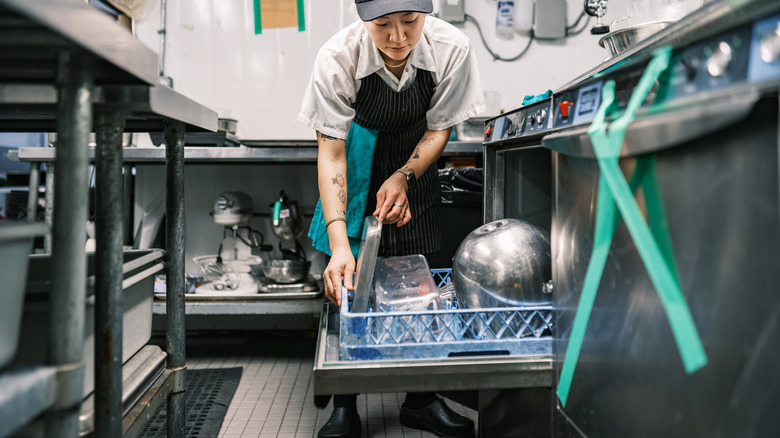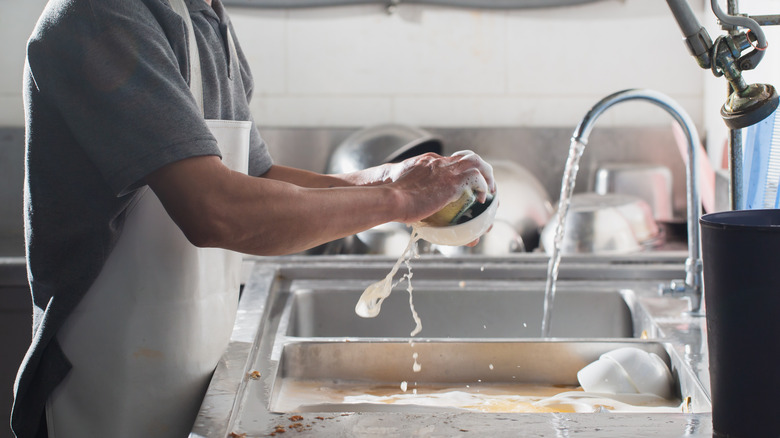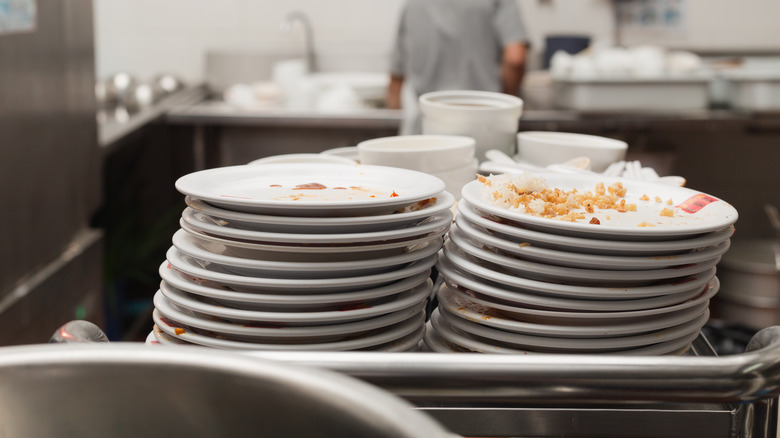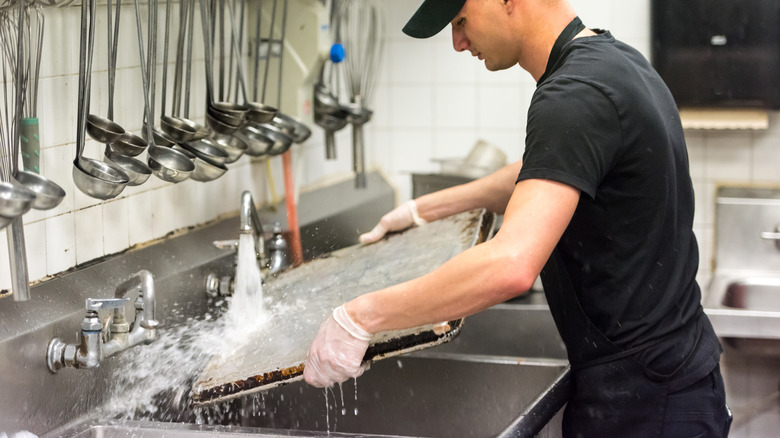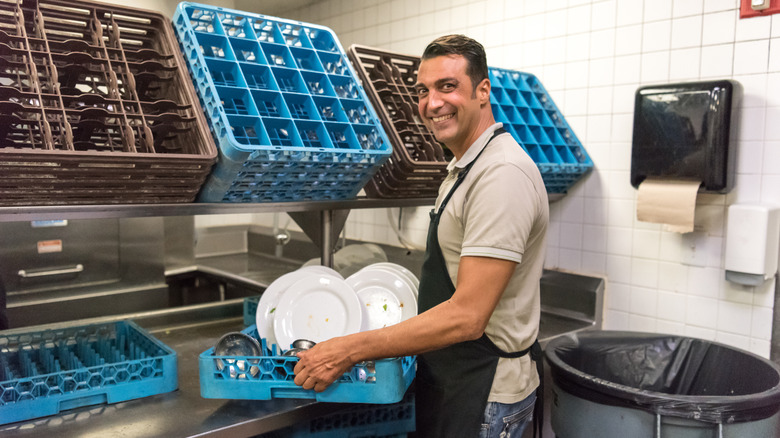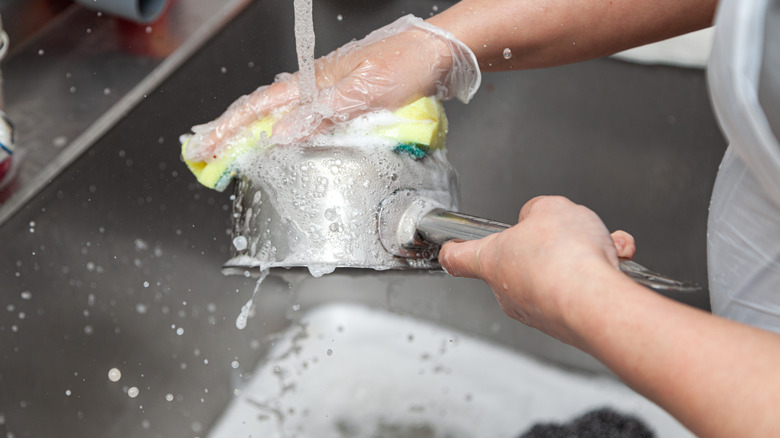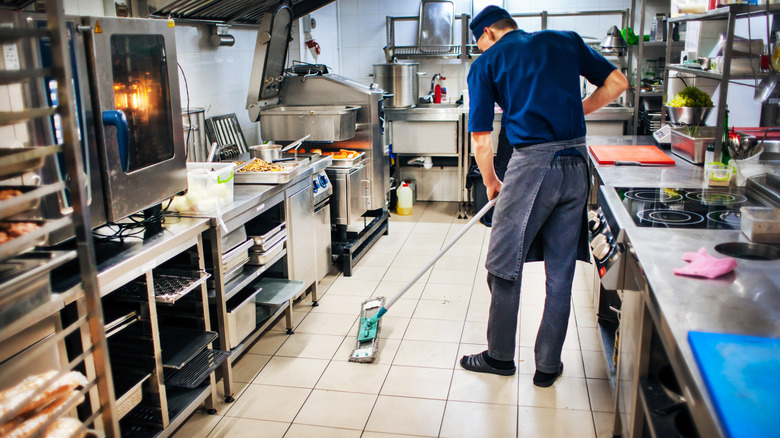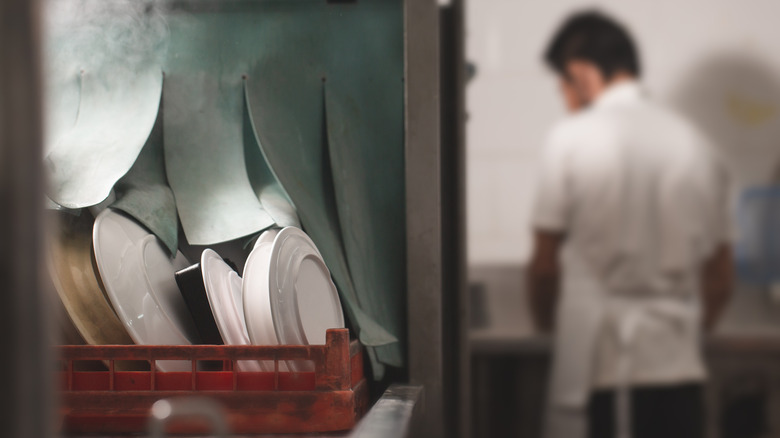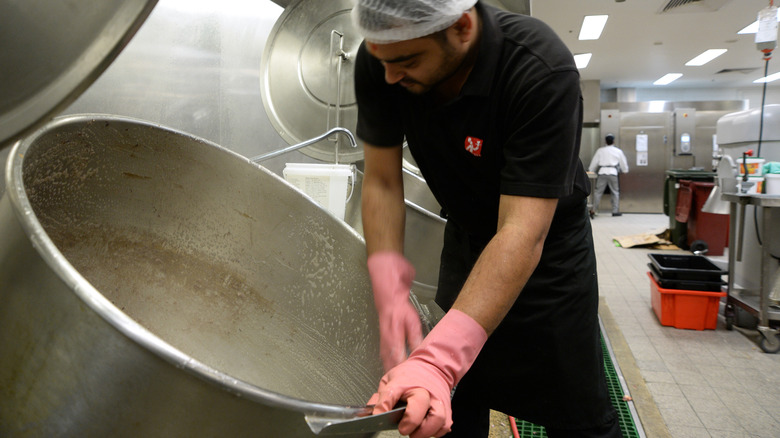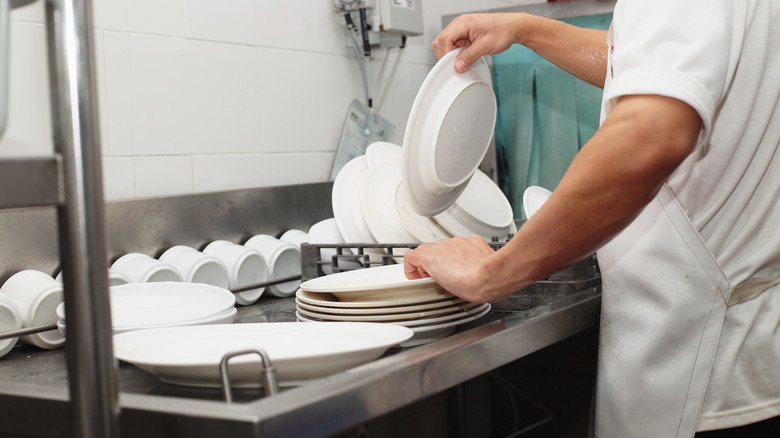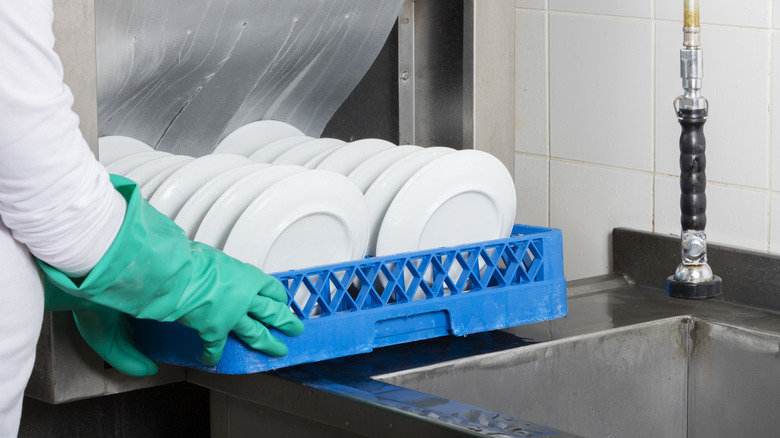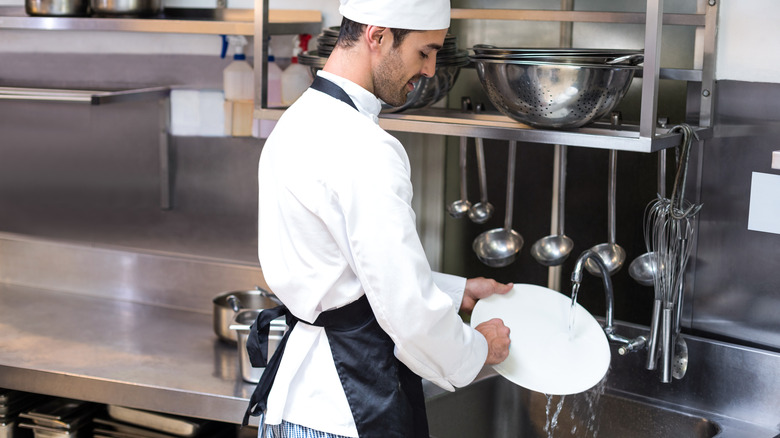What Working As A Restaurant Dishwasher Is Really Like
What do a conveyor belt sushi restaurant and the best barbecue restaurants in the U.S. have in common? There's always someone behind the scenes washing up so that plates of delicious sashimi and grilled meats can be served to hungry customers. Chefs trained in Japanese cuisine and grilling masters alike need a reliable and efficient dishwasher, or kitchen porter — also known as a KP — to make sure cookware, as well as tableware, is clean and ready for use. A good dishwasher may be vital, but the reality is that it's not a job that suits all, with plenty of those who've tried it remembering it without much fondness.
As with any work, it's the environment, attitude, and people who make or break the experience. While dishwashing is not considered a skilled job, it's easier to get into than some positions. And with the restaurant industry constantly expanding, where there's dirty plates, there's a KP in waiting with a jet washer. The number of openings in this area is on the rise, and while some of the work might not be pretty, recruitment is plentiful in areas with lots of eateries at least. Dishwashing at a greasy spoon might be far removed from a fine-dining establishment, but for the most part, the actual work is not too dissimilar. Find out what working as a restaurant dishwasher is really like.
It's hot and steamy
The dishwashing area of most restaurants is characterized by blasts of high-temperature water from jets and industrial pot washing machines. While it's not as glamorous as working as a watersports instructor by a paradise beach, it's potentially just as hot and humid. A busy shift means lots of steam rising off of freshly washed crockery as the kitchen's demand for fresh plates rises along with the temperatures. If there are a lot of diners ordering all at once then the tempo can pick up considerably — and anyone who hates looking sweaty, and possibly a bit grimy, might find this type of work too much. Although, who's to say all those steam inhalations don't do wonders for the skin?
Imagine a wet room in your kitchen that's constantly steaming up, and you've got some idea of the conditions dishwashers work in. This environment is noted by plenty of dishwashers on Reddit as a major challenge. With the speed of the cleaning, water inevitably sloshes out over sinks and sprays the floor, surfaces, and anyone in the vicinity. Any dishwasher knows that waterproofs, such as a rubber apron, gloves, and shoes are key. Light clothes are also necessary to combat the heat. Otherwise, they can expect to finish their shift soaking from water and sweat which is fine as long as they have a change of clothes. Wet floors can be slippy so Dansko or Croc-style footwear is popular in kitchen jobs; it's not a place for vanity.
It's messy and can smell funky
Do you love a clean workstation and adore a vase of fresh flowers nearby giving off a delicate floral scent? Are order and neatness important to you as well as a steady workflow? If you like the tinkle of light chat with colleagues and the gentle clatter of keyboards in a corporate environment, you're probably not going to find that while dishwashing. It's messy and can smell funky and with everyone rushing around under pressure, it's also a noisy place to work. It's definitely not suited to those sensitive to these distractions.
If you were to stack up plates along with pots and pans after making a fresh sardine pasta dish at home, then you might have a few aromas lurking. Things might start to get a bit stinky if there are leftovers or simply if the crockery hasn't been submerged in soapy suds to soak. Imagine what it must be like in a busy restaurant. One dishwasher on Reddit describes the environment as "hectic" and "gross" and that could be an understatement during an especially busy sitting. To avoid bowls and plates turning into teetering, stinky towers, a dishwasher has to be efficient. Understanding order and how to prioritize reduce these occupational pain points.
It's potentially dangerous
In the list of the world's most dangerous jobs, it might not be in the Top 10. However, being a dishwasher isn't exactly hazard-free. As Reddit posts reveal, this position in the kitchen involves navigating slippery floors and handling sharp chef knives, and then there's the potential of burns from steam and even soap in your eyes. It certainly sounds way riskier than paperclipping some documents in an office or answering a few emails at a desk job. However, it's less adventurous than other gigs for sure and not a high-risk career in general.
Then there are chefs tossing hot pans into the wash-up, and trays that are so large they look like props from a giant's kitchen. With hot water squirting out of snake-like hoses and machines whirring, breakages are inevitable. Jagged edges of broken plates and glasses have to be handled with care, which is no mean feat in a chaotic kitchen. Lifting huge trays full of pots and glasses poses all sorts of possible dangers, too. Following safety rules and understanding the order of how a kitchen operates is vital so that dishwashers not only safeguard themselves but also the wellbeing of their colleagues. When the pressure is on, waiting staff can fling down cleared plates haphazardly and chefs might shout for pans to be washed without delay. While it might not be the highest position in the kitchen, it's up to the dishwasher at the hub to ensure that safety comes first.
It's instantly gratifying
The role of a dishwasher in a large or at least a busy restaurant can seem somewhat thankless on the surface. The conditions don't exactly exude comfort, and then there are the safety dangers. On top of that, dishwashers are often viewed as having the lowest position in the kitchen, if not the whole restaurant, and the pay can fall below the living wage. You've then got the humdrum repetitiveness of tasks each shift which no doubt jars with the fact that there's often no let-up in what needs to be done.
And yet, if you pop on your earphones and listen to some tunes (assuming the company allows it) and stay centered in your own area and role, dishwashing can be a good gig. It often appeals to those who like to be busy but not be bothered too much by others and left to get on with their job. Once you've learned how to work with a system and created a steady workflow, it can be perhaps surprisingly satisfying. Dishwashers posting on Reddit have explained the ways in which the job can be relaxing — who doesn't love the gratification that comes from transforming a dirty pot into a gleamingly clean one? Dishwashers bring a sense of practical order to a commercial kitchen that can also inspire feel-good motivation with instant results.
It's about knowing how to clean
Let's say you've invited some friends over for a hearty, home-cooked meal. Once the plates have been cleared between courses you may be left with a fair amount of washing up at the end of the night. If it's a family dinner or a more casual affair with close friends, then everyone might pitch in and help. Otherwise, it's often the case of washing glassware in hot water, leaving a few pans to soak, and loading the dishwasher with everything else. In a restaurant kitchen, it's not just when you clean that matters, how quickly, or in what order. Dishwashers also have to know how to clean in the right way — and that's not as straightforward as it might sound.
Since time and efficacy are of the essence — after all, chefs can't serve food if there aren't any clean plates — then dishwashers need to be cleaning gurus. While a cloth may wipe away food from a non-stick pan, a grill with burnt-on grease might need more elbow grease and a rougher scourer. Blasting with pressurized jets of water and soaking play a part as does rinsing in clean water in a separate sink. Dishwashers need to know what has to be put through a dishwasher machine and also what fits, as well as what detergents work best. Cleaned items need to be dried in a sanitized way, away from dirty areas and only be stored away when they are fully dry.
It's about more than cleaning pots
Dishwasher roles may vary, depending on the setup of individual kitchens and the size of the restaurant, so too do the tasks involved. There are undoubtedly positions within a wash-up area that literally only involve one part of the process, such as loading dirty plates into a dishwashing machine or moving trays of clean glasses to the bar. However, there are plenty of tasks that can be assigned to this station that you might not be aware of.
As a dishwasher, you might have to bring used items to the sinks from other parts of the kitchen and scrape off any food before passing them along to the washing machine. A lot of cleaning is done by hand too, with water jets and sponges, especially fragile or large kitchenware that can't go into a machine. After drying, it's often up to the dishwasher to stack and arrange clean items and possibly even replenish crockery and utensil areas. Checking if there's enough tableware and kitchenware before the restaurant is open can also be part of the job description. Moving garbage bags and cleaning surfaces, including mopping floors, at the end of a shift could also be included. Other tasks might include filling out checklists for health and safety and making sure there are enough supplies in terms of detergents in the wash-up area. Communicating with chefs and waiting staff is also a big part of the dishwasher's skillset.
It's often anti-social hours
Dishwashers don't just have to be open to often working quirky hours but positively embrace them. When everyone else seems to be enjoying a leisurely lunch or a special dinner at the weekend, dishwashers are the ones making the hospitality magic happen in restaurant kitchens. Each job is different, as a café that serves early breakfasts might need a dishwasher at dawn. A late-night eatery may expect workers to be cleaning down at midnight. And then there are split shifts with long lunch and dinner shifts in the same day. Missed social and sporting events with precious little time off can be a disadvantage of this job.
For some, these anti-social hours are what they thrive on. Unlike the 9-5 crowd, they can run errands in the morning and participate in sunny afternoons in the park before an evening start. Night owls who dig getting up late are also in luck. If you've ever done shift work, including working outside of the conventional workday, then you'll know that it's super important to be organized with the rest of your life. Dishwashers sometimes get food at work, but with split shifts and a heavy workload, it's great to be able to have easy-to-make meals on hand to prep at home. Simple 20-minute recipes are a lifesaver for busy nights and balanced suppers can often be made in advance. Meanwhile, hospitality workers often create their own social lives when everyone else is working or asleep.
It's physically demanding
Unlike most corporate jobs, dishwashing is more of a physical challenge. Of course, there's a good deal of thought that goes into being organized and following systems, but the bulk of the tasks involve rolling up the sleeves, quite literally. While you don't have to be a bodybuilder, the job often entails lifting heavy trays and pots and hoisting them around. Even standing up over a sink for hours at a time can take its toll, especially as shifts can be longer than the average day. Working in a busy kitchen can leave anyone dog-tired and the hot, wet conditions only add to the burden.
Being organized lightens the load, and dishwashers who don't get overwhelmed during chaotic periods find they're less exhausted by the rigors of the job too. On the plus side, compared to many sedentary roles, being active is a good way to keep fit, and there's nothing like a hot kitchen and a full-on washing-up shift to keep you on your toes. One former dishwasher on Reddit laments how swapping to a desk job has left them feeling less healthy, comparing dishwashing to a paid workout. Taking designated breaks, learning to slow down during quiet periods, and staying hydrated are good ways to make the physical demands of the gig less arduous. The hard work that this role requires is great training for being industrious in future jobs, which is no doubt attractive to prospective employers.
It's vital to be across health guidelines
When you're rustling up recipes at home there are dangerous cooking mistakes you'll want to avoid and it's always good to know how to prevent food poisoning. Likewise, anyone working in a kitchen would be wise to make sure they are across health and safety guidelines. This doesn't just apply to chefs who are chopping raw foods to prevent cross-contamination, nor does it only guide waiting staff and front-of-house employees on how to handle cooked dishes properly and to make sure their hair is tied back and not played with during service. Dishwashers are also part of these measures.
For example, food that's being defrosted and prepared shouldn't be placed in the dishwashing sinks. And hands should be washed away from this area as well. Hand-washed dishes should be washed in water that's at least 110 degrees Fahrenheit. Plates with food should be scraped first and then rinsed after washing. Dishwashers are often in charge of using sanitizers and it's important that utensils and kitchenware are cleaned in the right amount of water, with the right amount of sanitizer added. Machines need to be stacked so that they're not too overcrowded, with bowls and cups facing down so they don't collect dirty water. As well as following health guidelines at work, dishwashers need to know when to call in sick so that they don't infect co-workers and customers. There are legal health codes to know as well as in-house rules and regulations.
It can affect your health
A leading health issue is stress, and there's no doubt about it that the hospitality industry isn't renowned for its calming working environments. However, dishwashers who get on with their colleagues and get into the rhythm of a shift may find the work not only stress-free but even meditatively enjoyable. Health problems that can arise from dishwashing are undoubtedly back problems and pain from overusing the arms or overextending the body. Standing up for long periods, bending over in the same ways, and the repetitiveness of the work can lead to physical issues, especially over time.
Other clear health risks are created from the use of cleaning detergents and sanitizers that contain potentially harmful chemicals. This relates to both hand-washing, general cleaning in the kitchen areas, and dishwasher machines also. Protective wear can guard against this, and ensuring hazardous liquids don't get in the eyes or irritate the skin is necessary so that injuries are not caused. Cookware and tableware that's fresh out of the dishwasher may be super-hot, and the water from powerful jets can be too. While those who can withstand a little heat might not let this bother them, the effects over time can leave the skin red, raw, and painful. As with any physically demanding job, every dishwasher should have a bottle of water within reach so that they don't become dehydrated. Because the work is tiring, it's important to let cooking healthy dinners go by the wayside after the shift has finished.
It's a good way into other restaurant kitchen jobs
Despite everyone in a commercial kitchen relying on a dishwasher, the job isn't always highly valued. As previously noted, the pay isn't always great, especially when compared to the hours, shift patterns, and actual job requirements. However, while there are plenty of horror stories, there are some who've been happy with the role. And there are those who see it as a great way into the hospitality industry at ground level and work your way up.
In a Washington Post feature in which the writer steps into the role of a dishwasher, it's revealed how important a job many expert chefs consider it. As the late Anthony Bourdain once quipped on "Fresh Air," "I jokingly say that I learned every important lesson, all the most important lessons of my life as a dishwasher. And in some ways, that's true." For anyone wanting to know the ins and outs of how a restaurant kitchen works, a dishwasher job could offer some good insights. In the right place, there's often an opportunity to try interesting foods, watch how chefs operate, and move into a different role. As with many industries, it's not just what you do but how you do it. Personality and approach can make you stand out in any position. A dishwasher who communicates well with chefs may find that they have a better chance of successfully applying for a trainee role or kitchen assistant position.
